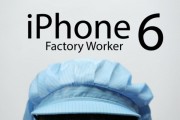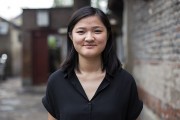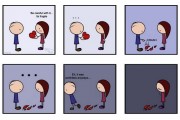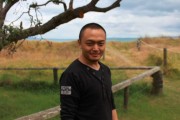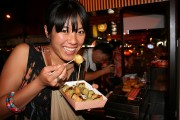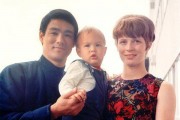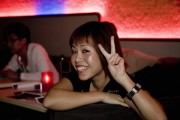
(onomatopoeic) = used as a mimic of the Chinese language
(informal) = “Hello fellow Asian Australian”
(actual) = a sound piece exploring the Chinese-Australian identity
G’day Ching Chong is a sound piece exploring the Australian identity through young ethnically Chinese people who now live in Beijing, China.
Making a move from their diverse Australian environments to a city of more than 22 million where they can be easily mistaken as a local, they’ve come to discover that what they look on the outside doesn’t necessarily reflect what they feel inside.
TRANSCRIPT
Alice Pung (AP):
The very first stereotype I guess is that we’re good at maths; we end up becoming doctors and lawyers; you eat cats and dogs; you steal jobs from the locals. They think we must be from some exotic land. “Go home Chingers,” y’know (laughs)
We don’t look white Australian, we have yellow faces.
Australia is a country of migrants.
There are no real Australians except the indigenous and the fact that we perpetuate this myth that there’s a true white Australian – back from the convict days, and everyone else is just a sham – is just ridiculous. It’s 200 years old. It’s a terrible myth.
MUSIC: Jin – “Learn Chinese”
AP
My name is Alice Pung and I come from Melbourne. I work as a writer and I work as a government lawyer as well.
Generally when people ask me “where I’m from?” I know they’re just interested. I take it as a cultural phenomenon because I lived in America for six months and Americans don’t ask that because they know it’s impolite and they know Asian-Americans have every right to be part of American culture. In Australia, we’ve always had a history of assimilation. Even recently on Australia Day you had slogans saying, “fit in or get out” and that has always been the mentality until 1980, which is why when Australians express fascination for people of different cultures they ask you that question, “oh where you from, you must be from somewhere interesting.” Personally I don’t take that as an insult but culturally we’re like a black and white television in the era of colour.
CLIP: “Tiny Delights” cooking show by Elizabeth Chong
Monica Tan (MT):
I don’t know about the food, I don’t know about the customs, I don’t know about any of the pop culture of any Asian country. My upbringing has been not very Chinese at all. So within like the first few minutes of meeting me you’ll forget that I’m Asian because I’m so not Asian.
Hi my name’s Monica Tan. I’m Australian and I’ve been in Beijing for six months. I study at Beiwai, studying Chinese…
Mark Hiew (MH):
My name’s Mark Hiew. I’m Australian Chinese. I’ve been in China about two and a half years…
Anne Lin (AL):
I’m Anne Lin and I’m from Sydney. I’ve been in Beijing for a year now and I’ve been studying at BLCU and my interests include watching live music and reading.
MH:
I grew up in Bunburry, Western Australia. It’s pretty homogenous; it’s a very white town. And I face a lot of outward discrimination probably on a weekly basis at least.
If you’ve heard a racial epithet about Chinese people, I’ve probably received it.
I also remember when I was in high school and my cousin and I was playing cricket and a couple of Aussie boys came and they were playing with us for a bit but then, they were starting to intimate the sort of physical hostility and I remember they made some sort of remark about us being “chinks” or something like that and just remember that epitomising my experience most of the time.
MT:
Growing up in Sydney, a very multicultural city, I can’t say that I’ve really experienced racism at all. But recently on Australia Day I happened to go to Foster. And my sister and I were on the beach and we were just chilling out and this local comes up to us and was like, “Konichiwa”. And I corrected him and was like, “we’re not Japanese we’re Chinese,” and then he’s like, “oh, you know, we don’t get many Chinese tourists out here.” And I had to qualify again, “we’re actually Chinese-Australian”. And he’s like “oh you’re Aussie then, OK OK,” and he was kinda hearing our accent. We chatted for a bit then when we were wrapping it up he was like, “well it was really cool to meet you, I’ve never met a Chinese person before,” and I was shocked and I literally was like “what? But there are so many of us.” And he’s like, “oh, but not out here. The only Chinese out here are the ones who own the Chinese restaurant”. And I’m like OK. And he’s like, “Yeah make sure you bring out all your friends out here,” y’know, all my Chinese friends I guess. And it was quite strange. He was being quite friendly and everything but it really did made me feel like an outsider. I mean a white person would just never experience that. So, I thought it was a pretty ironic thing to happen on Australia Day.
CLIP: 2008 Australia Day Ad
AL:
I grew up speaking Cantonese at home and my mother, also like a lot of other Chinese people growing up, sent me to Chinese school so I did grow up with a lot of Chinese influences, and I was very aware that I had two very separate identities, being Australian and being Chinese.
Since I’ve been in China I’ve actually found myself feeling more Australian than ever before. Ethnically I’m Chinese, but my nationality is Australian. So I can’t help the fact that in my DNA I’m Chinese looking but I don’t feel any of those ties towards China.
CLIP: Dave Chappelle “Untrained Eye”
MT:
All these Australian-Chinese now who were born and raised in Australia, we’re coming of age, we’re hitting our thirties, we’re becoming a part of the landscape in Australia. We’ve really negotiated very well these two ideas of having your ethnic identity as well as doing the whole Australian thing. And now to be Aust is not so narrow as it was before. You don’t just have to be a “bogan surfie” or live in the country. You can be in the city, live whatever lifestyle and hold that title of being Australian.
MH:
Part of the thing that I take as being uniquely Australian is the sense of fairness and justice as well a sort of larrikin ability to laugh at oneself. These are the sorts of things that a 21st century increasingly cosmopolitan Australia will be embracing and will retain and these are the sorts of values I cherish and hold as very dear.
AP:
Australian television is all white and there will be the occasional ethnic. Until we infiltrate popular media with images of a multicultural – and not just in an ethnic sense – oh look at them they’re doing dragon dances or look at them eating felafels – as in Asians buying bread, Aboriginal people advertising toothpaste, it’s going to take a long time.
